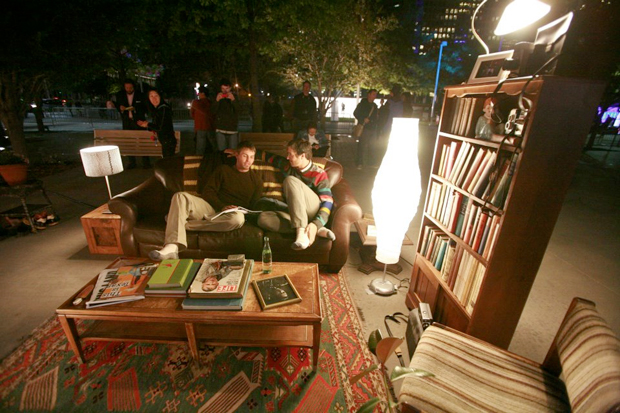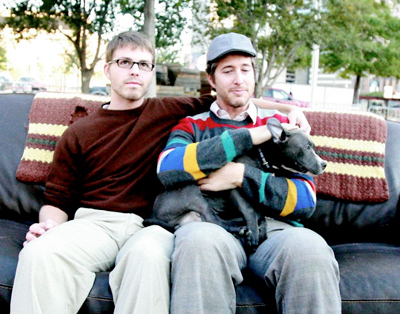Oral Roberts’ grandson vacuums and makes coffee in a public display designed to debunk the idea that there’s an ominous ‘gay agenda’

GAY AGENDA | Randy Roberts Potts and his boyfriend, Keaton Johnson, perform ‘The Gay Agenda’ to show what ordinary lives gays and lesbians lead. (Photo by Ange Fitzgerald courtesy of Randy Roberts Potts)
DAVID TAFFET | Staff Writer
taffet@dallasvoice.com
To bridge the gap between what most evangelicals imagine when they think of a gay couple and what he knows most gay couples do, Randy Roberts Potts has come up with The Gay Agenda, a performance piece designed to be boring.
For a weekend, Potts, the out gay grandson of evangelist Oral Roberts, and his boyfriend Keaton Johnson will set up house, so to speak, in a public space in various locations in the central U.S. They will watch TV, make coffee and even take a nap.
What they won’t do is kiss or even touch much.
And they hope people from the area will come and watch — but only for a short time. Because what they’ll be doing is extremely boring.
They expect that local media will come and talk to them about their mundane lives. And on Sunday morning, Potts hopes a local church will allow him to come and speak.
Like many gay people, Potts had to deal with family issues wrapped up in religion. And like many other gay men, before he came out, he married and had three kids.
But Potts’ family was a special challenge. His grandfather Oral Roberts’ side of the family was the liberal side.
Potts said that he hasn’t spoken to his mother — Oral’s daughter Roberta who sits on the board of Oral Roberts University — in a year. But he doesn’t mourn that loss. He said he never had a close relationship with her.
On his father’s even more conservative side of the family, dancing was out and they never watched movies. Potts said he taught cousins on that side of the family what the pictures and numbers on playing cards meant.
But Potts is healthy and happy. He shares joint custody of his children and adores them. He and his boyfriend just celebrated their one-year anniversary. And his boyfriend’s family has warmly welcomed him into their family.

AND PUPPY MAKES 3 | Potts and Johnson spent most of their time at the Aurora Arts Festival on the sofa watching TV. (Photo by Ange Fitzgerald courtesy of Randy Roberts Potts)
But Potts understands the pain many people from similar backgrounds feel. And he knows that much of it comes from the misconception people have about the lives gay people lead.
Before taking their show on the road, Potts and Johnson did a test run at the Aurora Arts Festival in the Arts District in Downtown Dallas on Oct. 30. They set up a living room along the street near the Winspear Opera House and proceeded to do those routine things people do at home. They spent much of the evening sitting and watching TV.
A small sign identified the art project. Potts said one woman watched curiously for a few minutes, then noticed the sign, grabbed her young daughter’s hand and moved along quickly. Others responded with amusement or simple bewilderment.
Potts said that there was little show of affection between him and his partner. He said that normally people don’t spend their time at home being affectionate. They just hang out together and do something dull like watch TV.
And the point wasn’t to shock people: When Potts and Johnson sat together on the couch, they were watching television. They weren’t kissing. They weren’t touching.
One of them got up to make some coffee. He brought a cup of coffee to the other, fixed the way he likes it. Again, that’s something couples do at home.
Boring.
That’s the point.
“Most people think of two men having sex,” Potts said. “This project is to push back on that stereotype.”
After the successful tryout in Dallas, Potts plans to take the installation on tour. Over the next year, he’d like to take the installation to some smaller cities, maybe one a month.
Tulsa? Maybe they’ll visit his hometown eventually. He said that may be the finale of the tour. But the first stop will be in his home state in Oklahoma City.
Potts said he’s not looking for confrontation or dangerous situations and he’s not looking to be a martyr. The goal is simply to perform The Gay Agenda in small cities throughout the center of the country.
In Dallas during the art fair, Potts said he felt safe performing out in the street. But in small-town America, he wants some level of protection.
So the plan is to rent an abandoned store window and borrow some living room furniture from some local gays so Potts and Johnson don’t have to haul their apartment all over the country. Then, for two days, they’ll lead their boring lives in the storefront for anyone in town to watch.
On Sunday morning, he said, he hoped a local church would allow the grandson of the famous evangelist to speak to the congregation.
“I don’t consider myself a preacher. “But churches are on the forefront of the battle for gay rights,” he explained.
To help fund the project, Potts is collaborating with the non-partisan Liberty Education Forum, a sister organization of Log Cabin Republicans. Potts said he thought that group would be a perfect partner because of its experience working in conservative areas.
He said the idea is to leave people with a different impression of gay people and what they do in their private lives in a way they’re not getting on television.
Potts said that the characters from Will & Grace and Modern Family have made The Gay Agenda possible. But this time the characters aren’t in New York or California, but right there in small-town America next to the kind of people the LGBT equality message needs to reach.
And while Potts doesn’t expect churches to suddenly embrace their LGBT members and neighbors, he hopes to nudge them toward providing a safer community.
If the piece succeeds in drawing attention and softening views, Potts said he’d like to see other same-sex couples perform The Gay Agenda in their own hometowns. But for now, he just hopes Liberty Education Forum will help him book about one performance a month over the course of the next year.
Why take the risk?
“If I felt accepted by my family, I wouldn’t go out and do this,” Potts said. “It’s my attempt to say, ‘I’m not that weird.’”
Johnson is in his late 20s and has been out since high school. His motivation is different.
“He wants to make things be the way he thought they always were,” Potts said.
Potts noted that there’s not much outreach to the evangelical community. The national organizations mostly work with potential allies. Most people in the LGBT community are afraid of or don’t know how to approach evangelicals.
But Potts knows that community intimately and deals with his strict religious upbringing with some amusement. He speaks of the university his grandfather founded with some pride, mentioning the school’s two best-known alumni — presidential candidate Michele Bachmann and Homer Simpson’s next door neighbor, Ned Flanders.
“Okaly dokaly,” Potts said. “Look at his wall. He has an ORU diploma hanging up.”
And although he tends to avoid contact with his immediate family in Oklahoma, Potts did attend his grandfather’s funeral. But he was not invited to sit with the family. And while his mother was delivering the eulogy, she spotted him in the audience. From the stage, in front of thousands of people, she began yelling at him.
Potts said he figures she was the one who looked foolish, not him.
Sharing the message
A year ago, Potts made an “It Gets Better” video dedicated to his Uncle Ronnie, Oral’s son who was also gay and who committed suicide. The video has gotten more than 130,000 hits.
And when he takes The Gay Agenda to smaller cities in Middle America, he said he hopes people will see that gays and lesbians lead the same sort of lives as straight people, that LGBTs aren’t a threat. If he gets to speak in a church, Potts said he hopes the congregation will get his simple message.
“I will be talking about the difference between tolerance and acceptance,” he said. “The LGBT community has been tolerated, in varying degrees, for the last 40 years since Stonewall. Tolerance is better than what came before, when our freedom of assembly rights were not guaranteed and even gay book clubs could be [and often were] stormed by the police.”
He said he wants people to understand that gays and lesbians would like to be open about themselves on Main Street, not just on a cruise, in a gay bar or on a gay-themed sitcom.
“Our little performance piece is symbolic of a move out of the ghetto and onto Main Street — how we’re received in each community will say a lot about how accepted our community is in that locale,” Potts said. “Our gay agenda, if there is one, is to be loved and accepted.”
This article appeared in the Dallas Voice print edition December 9, 2011.














Way to go Randy, I’m rooting for you: okaly dokaly.
this dude would not be able to do all of this if his grand daddy ORAL ROBERTS did not screw people out of their money….HYPOCRITE
You go Randy! I’m rooting and praying for ya’ll.
“A small sign identified the art project. Potts said one woman watched curiously for a few minutes, then noticed the sign, grabbed her young daughter’s hand and moved along quickly. Others responded with amusement or simple bewilderment.”
If we don’t want other people to make assumptions about us we don’t want to make assumptions about other people either. Aurora was a huge amazing success but it was very cold that night. Grabbing her daughter’s hand and moving along quickly could have been because of a multitude of reasons.
Who the crap cares how faggots and lesbians live? When you guys going to
Understand it’s what you do to have sex is what people look at! Did you faggots happen to include that in your little propaganda shows, or is that what you would
Call to taboo.. What goes on in your house should stay in your house. You think
People are that shallow? You guys are idiots. You have a TV you watch it,,, you have carpet
you clean it,.you need to piss you piss. Don’t use your propaganda crap to make people
look stupid. It’s you in my opinion that looks stupid!
Ron –
Let’s start here: What did you read in this piece that makes you think anyone wants to make anyone look stupid?